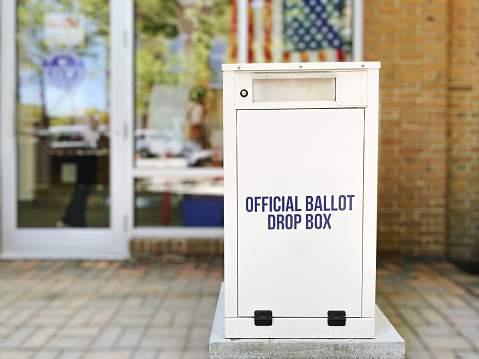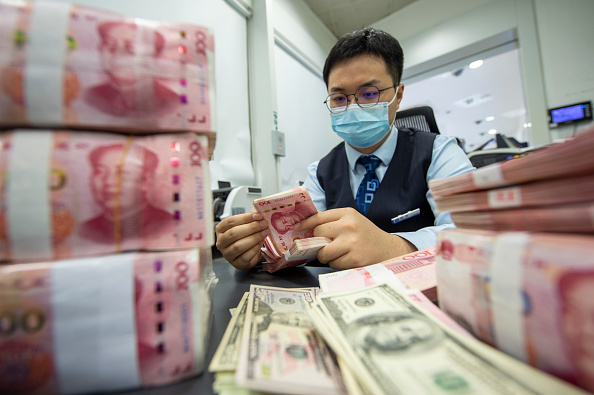
 Elections Incoming
Elections IncomingThe U.S. midterm elections are just over one month away, and the races are heating up. While foreign policy doesn't tend to dominate U.S. domestic politics, the perceived threat from China has dominated both the left and right sides of the aisle, cutting across the spectrum of issue areas that are core to November's voting bloc.
The outcome is still up for grabs but Republicans do appear poised to retake the House, and they claim they will "be laser focused on China threat issues," including China's alleged state sponsored cyberattacks against the United States; supply chain security; Taiwan's defense, and more.
In the meantime, the FBI has accused Russian and Chinese government-affiliated operatives and organizations of promoting misinformation about the integrity of American elections. The FBI has said that Chinese operatives are engaging in more "Russian-style influence activities" that stokes American divisions, such as setting up fake accounts posing as Americans, attacking politicians from both parties and posting inflammatory material about divisive issues such as abortion and gun rights.
Chinese and Russian officials have historically rejected U.S. allegations of election meddling and pointed in turn to American influence efforts in other countries.
Read more in "A Crisis and an Election," by Li Zheng, an Assistant Research Professor at the China Institutes of Contemporary International Relations.
 Global Spiral
Global SpiralThe U.S. dollar has appreciated to multi-decade highs in the wake of the Federal Reserve's aggressive tightening policy, causing havoc for currencies around the world. Now, the United Nations is warning that its actions, along with those of other central banks, risk pushing the global economy into recession.
Currencies and stock markets in Asia's biggest economies have plunged to historic lows, which haven't been seen since the 1997 financial crisis. Amidst the chaos, China saw the yuan fall to a 14-year low of nearly 7.27 against the dollar last week in international trading. In response, the Chinese central bank has taken a series of measures to slow the currency's depreciation, including warning speculators against making bets on it.
In a report, the Economist Intelligence Unit said there is little risk of a repeat of the 1997 Asian Financial Crisis, particularly given healthier levels of foreign exchange reserves in Asian countries, however the pressure facing Asian currencies will likely last for another quarter, if not longer.
Against this backdrop, the World Bank has downgraded its 2022 China growth outlook from 5% to 2.8%, meaning that China's growth looks set to "be weaker than the rest of the Asian-Pacific region for the first time in three decades."
Read more in "China's Economic Downturn: A Use Case for the e-CNY," by Christopher McNally, a Professor of Political Economy at Chaminade University.
 Golden Week
Golden WeekChina's National Day "golden week" began last Saturday to commemorate the founding of communist China on October 1, 1949. Initially a three-day break, the holiday was extended to seven days in 1999 to allow people to take longer trips and boost consumption.
But this year's golden week is once again surrounded by COVID-19 restrictions, meaning less travel and less holiday spending. Health authorities have also encouraged people to stay in their cities until the end of October in efforts to clamp down on outbreaks ahead of the 20th Party Congress, leading to further decreases in economic consumption.
Entertainment revenues fell by around $50 million USD from the first weekend of last year's golden week, and the domestic tourist industry has suffered a fall in numbers, leading the already battered economy to take yet another hit.
But despite ongoing restrictions and growing domestic frustrations, Chinese state media, the Global Times, reported that the country is welcoming the holiday with assurance in the nation's future. "Local governments are taking more measures to boost the holiday economy while at the same time fighting against COVID-19," it said. The report also noted that "the resilience of the Chinese economy and remarkable recovery expectations ahead remain unchanged, with Chinese people having full confidence in the country's prospects."
Prepared by China-US Focus editorial teams in Hong Kong and New York, this weekly newsletter offers you snap shots of latest trends and developments emerging from China every week, while adding a dose of historical perspective.
- 2022-09-30 Hot Intrigue
- 2022-09-23 Global Gridlock
- 2022-09-16 Injecting Stability
- 2022-09-09 Cutting Edges
- 2022-09-01 A Win for Global Business
- 2022-08-26 A Heavy Price
- 2022-08-19 Risky Business
- 2022-08-12 Backtracking
- 2022-08-05 Cross-Strait Outrage
- 2022-07-29 Playing with Fire
- 2022-07-22 Nixonian Flexibility
- 2022-07-15 List Diplomacy
- 2022-07-08 Easing Tariffs, Not Tensions
- 2022-07-01 Getting Tough
- 2022-06-24 Tools in the Box
- 2022-06-17 Unprecedented Oversight
- 2022-06-10 Squaring Off
- 2022-06-03 Diplomatic Chills
- 2022-05-27 Competing Visions
- 2022-05-20 Common Ground
